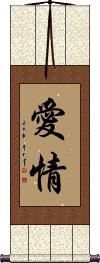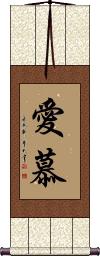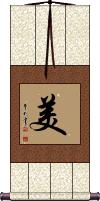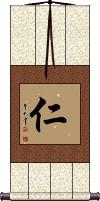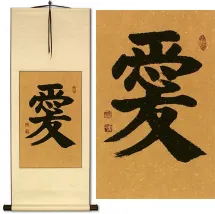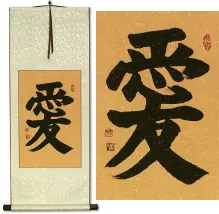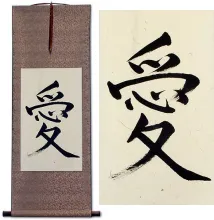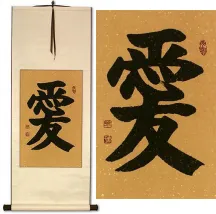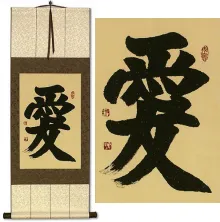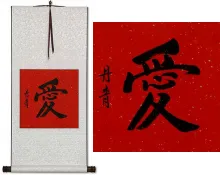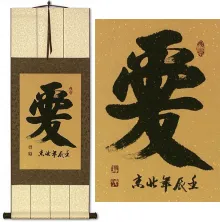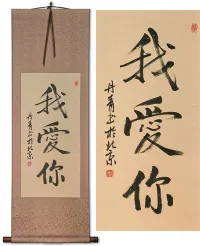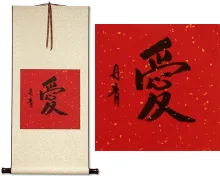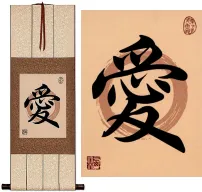Many custom options...
And formats...

Love the Woman in Chinese / Japanese...
Buy a Love the Woman calligraphy wall scroll here!
Personalize your custom “Love the Woman” project by clicking the button next to your favorite “Love the Woman” title below...
2. Adoring Love
4. Beauty / Beautiful / Handsome
5. You are always a beauty in your lover’s eyes
6. Benevolence
7. Islam
Love and Affection
愛情 is a universal word in Japanese, Korean, and Chinese which means love and affection.
Some may translate this as “love between a man and a woman.”
Depending on the context, it can mean utter devotion or favorite.
Adoring Love
愛慕 means “adoring love” in Chinese, Japanese, and Korean.
I suppose this is the best kind of love to have. 愛慕 has the common character for love. But the second character modifies and reinforces the meaning to become adore, adoring love, or to love and adore.
Ancient Chinese warning:
Adoring someone is fine until you are in the shoes of the Prince of the Kingdom of Wu. This Prince adored a certain beautiful woman (Xi Shi) so much that he neglected his duties and soon let the kingdom fall into ruins.
I Love You / Aishiteru
It's very uncommon (some will say taboo) to say “I love you” in Japanese culture. It's especially awkward for a man to tell a woman this in Japanese. Everyone is more likely to say “Watashi wa anata ga suki desu” or “I like you” (literally, “I regarding you, have like.”
If you have to say “I love you” in Japanese, 愛してる is a selection of Kanji and Hiragana that provide a way.
Note: Because this selection contains some special Japanese Hiragana characters, it should be written by a Japanese calligrapher.
Beauty / Beautiful / Handsome
美 is often used to describe the beauty of a woman.
However, when applied to a man, it can mean handsome. It's also the first character in the word for “beauty salon” which you will see all over China and Japan.
This can be used as the given name for a girl (spell it or say it as “Mei” or “May”).
For a bit of trivia: The title for the “USA” in Chinese is “Mei Guo” which literally means “Beautiful Country.” This name was bestowed at a time before Chairman Mao came to power and decided that China didn't like the USA anymore (even though we fought together against the Japanese in WWII). But these days, Chinese people love Americans (but have a distaste for American politics and policy). But I digress...
美 is also how “Beautiful” is written in Japanese Kanji and Korean Hanja. 美 can also mean: very satisfactory; good; to be pleased with oneself; abbreviation for the USA; fine; handsome; admirable; madhura; sweet; and/or pleasant.
See Also: Beautiful Woman | Beautiful Girl
You are always a beauty in your lover’s eyes
Any woman with affection for Asian art will love a gift of this Chinese proverb calligraphy on a wall scroll.
She will melt in your arms as you tell her the meaning of these characters.
Contained in this phrase is a reference to the most beautiful woman in Chinese history. Her name was Xi Shi, and she was known to have good looks that need not have fine robes or makeup. Her charms were so powerful that she brought down an entire kingdom (in a successful effort to bring honor and pride back to her people).
情人眼里出西施 is a great way to express that the woman in your life is your one love.
Benevolence
Beyond benevolence, 仁 can also be defined as “charity” or “mercy” depending on context.
The deeper meaning suggests that one should pay alms to the poor, care for those in trouble, and take care of his fellow man (or woman).
仁 is one of the five tenets of Confucius. In fact, it is a subject that Confucius spent a great deal of time explaining to his disciples.
I have also seen this benevolent-related word translated as perfect virtue, selflessness, love for humanity, humaneness, goodness, goodwill, or simply “love” in the non-romantic form.
This is also a virtue of the Samurai Warrior
See our page with just Code of the Samurai / Bushido here
Islam
(phonetic version)
伊斯蘭教 both means and sounds like “Islam” in Mandarin Chinese.
The first three characters sound like the word “Islam,” and the last character means “religion” or “teaching.” It's the most general term for “Islam” in China. The highest concentration of Muslims in China is Xinjiang (the vast region in northwest China that was called The East Turkistan Republic until 1949 and is sometimes called Chinese Turkistan, Uyghuristan). Here you will find Uygurs, Kazakhs, Kyrgyz, and others that are descendants of Turkmen (possibly mixed with Persians and Arabs). Many of their ancestors were traders who traveled the silk road to buy and sell spices and silk and exchange other goods from the Orient and the Middle East.
I spent some time in Xinjiang and got to know this community. They are strong people who can endure much. They are friendly and love to have a good time. I was a stranger but was treated by villagers (near China's border with Afghanistan) as if I was a good friend.
However, I have heard that it's best not to cross them, as in this land, the law is the blade, and everything is “eye for an eye.” The Chinese government has little control in Xinjiang, with almost no police officers except in the capital of Urumqi (so it's a 60-hour roundtrip train ride to seek the aid of law enforcement in most cases).
While few seem devout, there are at least small mosques in every village. And you will never see a man or woman outside without a head covering.
It should be noted that these people are all citizens of China, but they are officially of the Caucasian race. A visit to Xinjiang will change your idea of what it means to be Chinese.
This in-stock artwork might be what you are looking for, and ships right away...
Gallery Price: $60.00
Your Price: $36.88
Gallery Price: $87.50
Your Price: $39.00
Gallery Price: $65.00
Your Price: $39.88
Gallery Price: $65.00
Your Price: $39.88
Gallery Price: $200.00
Your Price: $122.88
Not the results for love the woman that you were looking for?
Below are some entries from our dictionary that may match your love the woman search...
| Characters If shown, 2nd row is Simp. Chinese |
Pronunciation Romanization |
Simple Dictionary Definition |
兒女 儿女 see styles |
ér nǚ er2 nu:3 erh nü |
children; sons and daughters; a young man and a young woman (in love) |
女房 see styles |
nyoubou(p); nyoubo; nyuubou(ok) / nyobo(p); nyobo; nyubo(ok) にょうぼう(P); にょうぼ; にゅうぼう(ok) |
(1) wife (esp. one's own wife); (2) (にょうぼう, にゅうぼう only) court lady; female court attache; woman who served at the imperial palace; (3) (にょうぼう, にゅうぼう only) (archaism) woman (esp. as a love interest) |
女色 see styles |
nǚ sè nu:3 se4 nü se joshoku; nyoshoku; joshiki じょしょく; にょしょく; じょしき |
female charms; femininity woman's beauty or charms; love affair with a woman; lust for women Female beauty— is a chain, a serious delusion, a grievous calamity. The 智度論 14 says it is better to burn out the eyes with a red-hot iron than behold woman with unsteady heart. |
妊夫 see styles |
ninpu にんぷ |
(1) (slang) (See ボーイズラブ) male pregnancy (in Boy's Love fiction); mpreg; (2) (rare) (See プレパパ) father-to-be; partner of pregnant woman |
婚い see styles |
yobai よばい |
(noun/participle) creeping at night into a woman's bedroom; stealing into a girl's bedroom at night to make love; sneaking visit |
腐女 see styles |
fǔ nǚ fu3 nu:3 fu nü |
fujoshi (woman who likes manga about male homosexual love) (derived from Japanese 腐女子 "fujoshi") |
ワセ女 see styles |
wasejo ワセじょ |
(1) female student or graduate of Waseda University; (2) (derogatory term) woman who allegedly pursues a career at the expense of love, feminine interests, etc. |
夜這い see styles |
yobai よばい |
(ateji / phonetic) (noun/participle) creeping at night into a woman's bedroom; stealing into a girl's bedroom at night to make love; sneaking visit |
姐弟戀 姐弟恋 see styles |
jiě dì liàn jie3 di4 lian4 chieh ti lien |
love between an older woman and a younger man |
干物女 see styles |
himonoonna ひものおんな |
(colloquialism) (See 干物・ひもの) young woman who has given up on love |
早稲女 see styles |
wasejo わせじょ |
(1) female student or graduate of Waseda University; (2) (derogatory term) woman who allegedly pursues a career at the expense of love, feminine interests, etc. |
腐女子 see styles |
fujoshi ふじょし |
(slang) (See ボーイズラブ) woman who likes comics depicting male homosexual love |
貴腐人 see styles |
kifujin きふじん |
(slang) (pun on 貴婦人) (See 腐女子) adult woman who likes comics about male homosexual love |
ワセジョ see styles |
wasejo ワセジョ |
(1) female student or graduate of Waseda University; (2) (derogatory term) woman who allegedly pursues a career at the expense of love, feminine interests, etc. |
十二因緣 十二因缘 see styles |
shí èr yīn yuán shi2 er4 yin1 yuan2 shih erh yin yüan jūni innen |
Dvādaśaṅga pratītyasamutpāda; the twelve nidānas; v. 尼 and 因; also 十二緣起; 因緣有支; 因緣率連; 因緣棘園; 因緣輪; 因緣重城; 因緣觀; 支佛觀. They are the twelve links in the chain of existence: (1) 無明avidyā, ignorance, or unenlightenment; (2) 行 saṃskāra, action, activity, conception, "dispositions," Keith; (3) 識 vijñāna, consciousness; (4) 名色 nāmarūpa, name and form; (5) 六入 ṣaḍāyatana, the six sense organs, i.e. eye, ear, nose, tongue, body, and mind; (6) 觸 sparśa, contact, touch; (7) 受 vedanā, sensation, feeling; (8) 愛 tṛṣṇā, thirst, desire, craving; (9) 取 upādāna, laying hold of, grasping; (10) 有 bhava, being, existing; (11) 生 jāti, birth; (12) 老死 jarāmaraṇa, old age, death. The "classical formula" reads "By reason of ignorance dispositions; by reason of dispositions consciousness", etc. A further application of the twelve nidānas is made in regard to their causaton of rebirth: (1) ignorance, as inherited passion from the beginningless past ; (2) karma, good and evil, of past lives; (3) conception as a form of perception; (4) nāmarūpa, or body and mind evolving (in the womb); (5) the six organs on the verge of birth; (6) childhood whose intelligence is limited to sparśa, contact or touch; (7) receptivity or budding intelligence and discrimination from 6 or 7 years; (8) thirst, desire, or love, age of puberty; (9) the urge of sensuous existence; (10) forming the substance, bhava, of future karma; (11) the completed karma ready for rebirth; (12) old age and death. The two first are associated with the previous life, the other ten with the present. The theory is equally applicable to all realms of reincarnation. The twelve links are also represented in a chart, at the centre of which are the serpent (anger), boar (ignorance, or stupidity), and dove (lust) representing the fundamental sins. Each catches the other by the tail, typifying the train of sins producing the wheel of life. In another circle the twelve links are represented as follows: (1) ignorance, a blind woman; (2) action, a potter at work, or man gathering fruit; (3) consciousness, a restless monkey; (4) name and form, a boat; (5) sense organs, a house; (6) contact, a man and woman sitting together; (7) sensation, a man pierced by an arrow; (8) desire, a man drinking wine; (9) craving, a couple in union; (10) existence through childbirth; (11) birth, a man carrying a corpse; (12) disease, old age, death, an old woman leaning on a stick. v. 十二因緣論 Pratītya-samutpāda śāstra. |
爭風吃醋 争风吃醋 see styles |
zhēng fēng chī cù zheng1 feng1 chi1 cu4 cheng feng ch`ih ts`u cheng feng chih tsu |
to rival sb for the affection of a man or woman; to be jealous of a rival in a love affair |
男出入り see styles |
otokodeiri / otokoderi おとこでいり |
woman with a turbulent love life; woman always having man trouble |
枕を交わす see styles |
makuraokawasu まくらをかわす |
(exp,v5s) to sleep together (for a man and a woman); to make love |
Variations: |
sayaate / sayate さやあて |
(1) (See 恋の鞘当て) rivalry in love; rivalry for the heart of a woman; (2) quarrel over something trivial; storm in a teacup; (3) (orig. meaning) quarrel between two samurai due to an (accidental) clash of sheaths while crossing paths |
神女有心,襄王無夢 神女有心,襄王无梦 |
shén nǚ yǒu xīn , xiāng wáng wú mèng shen2 nu:3 you3 xin1 , xiang1 wang2 wu2 meng4 shen nü yu hsin , hsiang wang wu meng |
lit. the fairy is willing, but King Xiang doesn't dream (idiom); (said of a woman's unrequited love) |
Variations: |
koinosayaate / koinosayate こいのさやあて |
(exp,n) rivalry in love; rivalry for the heart of a woman |
Variations: |
yobai よばい |
(noun/participle) creeping at night into a woman's bedroom; stealing into a girl's bedroom at night to make love; sneaking visit |
Variations: |
yobai よばい |
(noun/participle) creeping at night into a woman's bedroom; stealing into a girl's bedroom at night to make love; sneaking visit |
Variations: |
yobai よばい |
(n,vs,vi) creeping at night into a woman's bedroom; stealing into a girl's bedroom at night to make love; sneaking visit |
The following table may be helpful for those studying Chinese or Japanese...
| Title | Characters | Romaji (Romanized Japanese) | Various forms of Romanized Chinese | |
| Love and Affection | 愛情 爱情 | aijou / aijo | ài qíng / ai4 qing2 / ai qing / aiqing | ai ch`ing / aiching / ai ching |
| Adoring Love | 愛慕 爱慕 | ai bou / aibou / ai bo | ài mù / ai4 mu4 / ai mu / aimu | |
| I Love You Aishiteru | 愛してる | ai shi te ru aishiteru | ||
| Beauty Beautiful Handsome | 美 | bi | měi / mei3 / mei | |
| You are always a beauty in your lover’s eyes | 情人眼里出西施 | qíng rén yǎn lǐ chū xī shī qing2 ren2 yan3 li3 chu1 xi1 shi1 qing ren yan li chu xi shi qingrenyanlichuxishi | ch`ing jen yen li ch`u hsi shih chingjenyenlichuhsishih ching jen yen li chu hsi shih |
|
| Benevolence | 仁 | jin | rén / ren2 / ren | jen |
| Islam | 伊斯蘭教 伊斯兰教 | yī sī lán jiào yi1 si1 lan2 jiao4 yi si lan jiao yisilanjiao | i ssu lan chiao issulanchiao |
|
| In some entries above you will see that characters have different versions above and below a line. In these cases, the characters above the line are Traditional Chinese, while the ones below are Simplified Chinese. | ||||
Successful Chinese Character and Japanese Kanji calligraphy searches within the last few hours...
